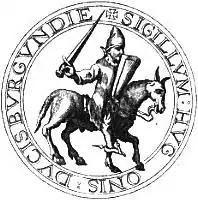| Hugh III | |
|---|---|
 Seal of Hugh III of Burgundy | |
| Duke of Burgundy | |
| Reign | 1162–1192 |
| Predecessor | Odo II |
| Successor | Odo III |
| Born | 1142 |
| Died | 25 August 1192 (aged 49–50) Acre |
| Spouse | |
| Issue Detail | Odo III, Duke of Burgundy Guy VI of Viennois Margaret of Burgundy |
| House | Burgundy |
| Father | Odo II, Duke of Burgundy |
| Mother | Marie of Champagne |
Hugh III (1142[1] – 25 August 1192[2]) was Duke of Burgundy between 1162 and 1192. As duke, Burgundy was invaded by King Philip II and Hugh was forced to sue for peace. Hugh then joined the Third Crusade, distinguishing himself at Arsuf and Acre, where he died in 1192.
Life
Hugh was the eldest son of Duke Odo II and Marie, daughter of Theobald II, Count of Champagne.[3]
The rule of Hugh III marked the ending of a period of relative peace in the duchy of Burgundy. Hugh was a belligerent man and soon was involved in conflicts against King Louis VII of France over their borders. When Philip Augustus succeeded Louis in 1180, Hugh seized the opportunity and forced several men to change their allegiance to Burgundy. Philip II was not happy with the loss of his vassals and invaded the duchy, besieging Châtillon in 1186.[4] The town fell and with it, its garrison, commanded by Odo, Hugh's heir.[4] A peace was negotiated and Hugh had to pay a high ransom for his son and give up ambitions over French territory.
In 1187, Hugh transferred the capital of Burgundy to Dijon, and endeavoured to turn the city into a major commercial centre.
Joins crusade
Hugh then turned his energies to the Holy Land, embarking in the Third Crusade in the retinue of Philip II.[5] Hugh played a major role in the victory of the Battle of Arsuf (7 September 1191) and at the Siege of Acre. When Philip returned to France in July 1191,[6] he left Hugh in charge of the French troops.[7] In January 1192, Hugh traveled to Ascalon and argued with Richard I of England over pay for his troops.[8] He died 25 August 1192 at Acre.[2][6]
Marriage and issue
He was married twice:
Firstly, in 1165, to Alice (1145–1200),[3] daughter of Matthias I, Duke of Lorraine; he repudiated her in 1183. With his first wife he had:
- Odo III (1166–1218),[3] his successor in the Duchy
- Alexander (1170–1206), Lord of Montaigu, married Beatrix of Montaigu[3]
- Douce (1175 – c. 1219), married in 1196 Simon of Semur (d. 1219), Lord of Luzy
- Alice (1177–1266), married Béraud VII, Lord of Mercœur and Robert VI, Dauphin d'Auvergne (d. 1252)
Secondly, in 1183, to Beatrice (1161–1228),[3] Countess of Albon and Dauphine of Viennois, daughter of Guigues, Count of Albon and Dauphin of Viennois. With his second wife, he had:
- Guigues VI (1184–1237), Dauphin of Viennois[lower-alpha 1]
- Mahaut (1190–1242), married in 1214 John I, Count of Châlon and Auxonne (1190–1267)
- Margaret (1192–1243), married in 1222 Amadeus IV (1197–1253), Count of Savoy[9]
Ancestry
| Ancestors of Hugh III, Duke of Burgundy | |||||||||||||||||||||||||||||||||||||||||||||||||||||||||||||||||||||||||||||||||||||||||||||||||||||||||||||||||||||||||||||||||||||||||||||||||||||||||||||||||||||||||||||||||||||||||||||||||||||||||||||||||||||||||||||||||||||||||||||||||||||||||||||||||||||||||||||||||||||||||
|---|---|---|---|---|---|---|---|---|---|---|---|---|---|---|---|---|---|---|---|---|---|---|---|---|---|---|---|---|---|---|---|---|---|---|---|---|---|---|---|---|---|---|---|---|---|---|---|---|---|---|---|---|---|---|---|---|---|---|---|---|---|---|---|---|---|---|---|---|---|---|---|---|---|---|---|---|---|---|---|---|---|---|---|---|---|---|---|---|---|---|---|---|---|---|---|---|---|---|---|---|---|---|---|---|---|---|---|---|---|---|---|---|---|---|---|---|---|---|---|---|---|---|---|---|---|---|---|---|---|---|---|---|---|---|---|---|---|---|---|---|---|---|---|---|---|---|---|---|---|---|---|---|---|---|---|---|---|---|---|---|---|---|---|---|---|---|---|---|---|---|---|---|---|---|---|---|---|---|---|---|---|---|---|---|---|---|---|---|---|---|---|---|---|---|---|---|---|---|---|---|---|---|---|---|---|---|---|---|---|---|---|---|---|---|---|---|---|---|---|---|---|---|---|---|---|---|---|---|---|---|---|---|---|---|---|---|---|---|---|---|---|---|---|---|---|---|---|---|---|---|---|---|---|---|---|---|---|---|---|---|---|---|---|---|---|---|---|---|---|---|---|---|---|---|---|---|---|---|---|---|---|
| |||||||||||||||||||||||||||||||||||||||||||||||||||||||||||||||||||||||||||||||||||||||||||||||||||||||||||||||||||||||||||||||||||||||||||||||||||||||||||||||||||||||||||||||||||||||||||||||||||||||||||||||||||||||||||||||||||||||||||||||||||||||||||||||||||||||||||||||||||||||||
See also
Notes
References
- ↑ Suger 2018, p. 153.
- 1 2 Rigord 2022, p. 126.
- 1 2 3 4 5 6 Bouchard 1987, p. 256.
- 1 2 Fawtier 1960, p. 131.
- ↑ Painter 1969, p. 85.
- 1 2 Lock 2006, p. 78.
- ↑ Gillingham 1999, p. 164.
- ↑ Lock 2006, p. 77.
- ↑ Cox 1974, p. 462.
Sources
- Bouchard, Constance Brittain (1987). Sword, Miter, and Cloister: Nobility and the Church in Burgundy, 980–1198. Cornell University Press.
- Cox, Eugene L (1974). The Eagles of Savoy. Princeton University Press. ISBN 0691052166.
- Fawtier, Robert (1960). Capetian Kings of France: Monarchy and Nation, 987-1328. Translated by Butler, Lionel; Adam, R.J. Macmillan.
- Gillingham, John (1999). Richard I. Yale University Press.
- Lock, Peter (2006). The Routledge Companion to the Crusades. Routledge.
- Painter, Sidney (1969). "The Third Crusade: Richard the Lionhearted and Philip Augustus". In Setton, Kenneth M.; Wolff, Robert Lee; Hazard, Harry W. (eds.). The Later Crusades, 1189-1311. University of Wisconsin Press.
- Rigord (2022). Gaposchkin, M. Cecilia; Field, Sean L. (eds.). The Deeds of Philip Augustus: An English Translation of Rigord's "Gesta Philippi Augusti". Translated by Field, Larry F. Cornell University Press.
- Suger (2018). Selected Works of Abbot Suger of Saint Denis. Translated by Cusamano, Richard; Whitmore, Eric. Catholic University of America Press.